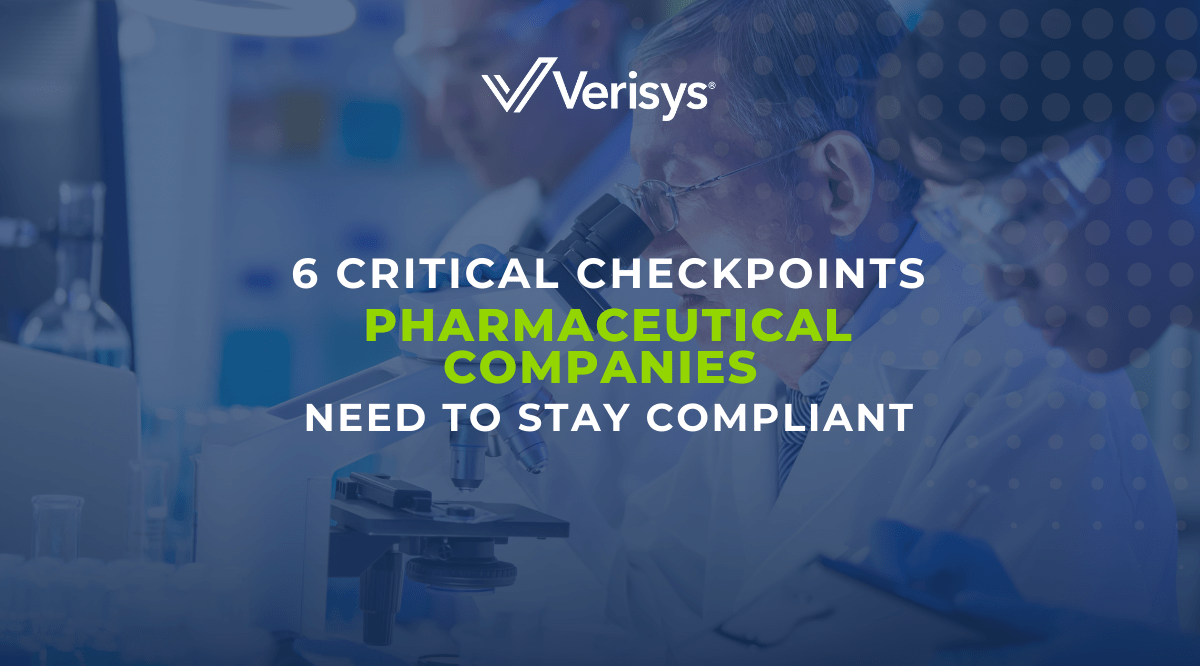– The best resource for monthly healthcare regulatory compliance updates. Compliance Updates: April 2024 Overlook: Licensure Compacts Other Legislation Board Updates Interstate Medical...


The more you know about the people in your organization, the safer you are from risks that could damage your company, your reputation, or your compliance. The regulations in the pharmaceutical industry are understandably strict, and to ensure your organization is compliant, every member of your team must be thoroughly vetted.
To stay compliant with healthcare regulations, laws, and guidelines, pharmaceutical companies should confirm they are implementing the following SIX critical checkpoints:
Now let’s dig into each one and what organizations can do to stay compliant.
Ensuring that employees, contractors, and business partners are not on federal or state sanction or exclusion lists is crucial to preventing fines and protecting their company’s reputation. Monitoring this regularly will keep a pharmaceutical company safe from unnecessary fines and reputational risks.
Comprehensive data companies like Verisys, offer FACIS®, a comprehensive database for sanction and exclusion screening, ensuring that pharmaceutical companies can easily identify individuals or entities that are barred from participating in federally funded healthcare programs .
Healthcare license monitoring ensures that all employees, especially those directly involved in patient care or handling sensitive medical data, are compliant with relevant healthcare regulations and standards. This helps avoid legal and financial penalties associated with non-compliance. Ensuring that all healthcare professionals within the organization are properly licensed and in good standing helps protect the company’s reputation. It demonstrates a commitment to high standards of care and compliance, which is crucial for maintaining trust with patients, partners, and regulators.
Advanced data and technology solutions, like those offered by Verisys, allow for continuous monitoring of healthcare licenses, making the process more efficient and reliable than traditional, manual methods. This ensures that any license-related issues are identified and addressed promptly, maintaining the integrity of the healthcare services provided.
By ensuring that all healthcare professionals in the organization have been verified through PSV, life science companies can maintain trust and integrity within the healthcare community and with patients. This is fundamental in building a reputable and reliable healthcare organization. Primary source verification (PSV) ensures the accuracy of the healthcare professionals’ credentials directly from the original source. This process confirms the legitimacy of qualifications such as education, licensure, certifications, and work history, which is vital for maintaining high standards of patient care and safety.
As the largest Credential Verification Organization (CVO) in the U.S., Verisys streamlines the credentialing process with faster turnaround times, and the most accurate and quality data in the industry, ensuring that all providers meet compliance standards.
By ensuring that all professionals have valid and authentic credentials, life science organizations can mitigate legal and financial risks associated with employing unqualified individuals. This also helps in avoiding potential harm to patients and participants in clinical trials, thereby safeguarding the organization’s reputation and integrity. Many regulatory bodies and accrediting organizations require stringent verification of credentials for professionals in the life sciences field. Adhering to these requirements is essential for organizations to operate legally and maintain their accreditation status. Accurate data is essential for compliance reporting to regulatory bodies. Inaccurate or incomplete reporting can lead to significant penalties and legal issues.
Companies must proactively identify potential risks in processes and products and develop strategies to mitigate these risks. This includes conducting risk assessments, implementing quality control measures, and developing plans for addressing compliance issues, including timely reporting and corrective actions. Modern supply chains in the life sciences sector are intricate, often involving hundreds or thousands of suppliers contributing to a single product. Identifying all suppliers, from raw materials to final products, can be challenging and time-consuming, making transparency difficult to achieve. The procurement function is crucial in managing supply chain risks as it directly involves selecting vendors and managing upstream supply chains.
Verisys can conduct thorough background checks on potential suppliers and vendors to ensure they meet the necessary legal and compliance standards. This can include verifying business licenses, sanction screenings, and checking for any history of legal issues that might pose a risk to the supply chain. Verisys offers continuous monitoring services that can help life science organizations stay ahead of potential risks by providing real-time updates on any changes in the status of their suppliers and vendors. This includes monitoring for sanctions, exclusions, and other regulatory compliance issues that could impact the supply chain.
Implementing effective compliance strategies in life science organizations is crucial due to the increasing complexity of regulatory requirements and the sensitive nature of the data they handle. Effective compliance management fosters trust, ensures data protection, and can drive business growth by leveraging regulations to the organization’s advantage. Compliance should be integrated into every facet of the organization’s operations. This involves training all staff levels comprehensively, using technology to streamline processes, keeping track of regulatory changes, and conducting regular audits and assessments to identify areas for improvement.
Life science organizations with strong compliance frameworks can efficiently manage changes during product development and are better positioned to demonstrate their commitment to compliance during audits, thereby minimizing the risk of penalties.
Verisys can provide insights and expertise on the complex regulatory landscape within the healthcare and life sciences sectors. Their understanding of federal and state regulations can help organizations navigate compliance challenges more effectively. Understanding that each organization has unique needs, Verisys offers tailored solutions that align with specific compliance requirements and business objectives. This approach ensures that life science organizations can address their particular challenges effectively.
By leveraging Verisys’ services, life science organizations can enhance their compliance strategies, reduce the risk of non-compliance penalties, and maintain the trust of their patients and stakeholders.